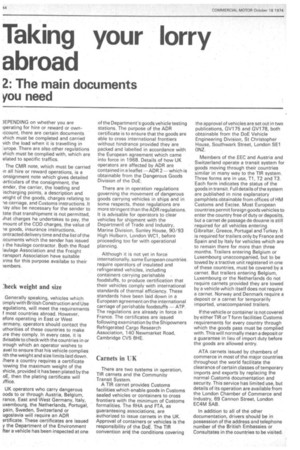Taking your orry abroad
Page 46

If you've noticed an error in this article please click here to report it so we can fix it.
2: The main documents you need
)EPENDING on whether you are iperating for hire or reward or owniccount, there are certain documents vhich must be completed and carried vith the load when it is travelling in :urope. There are also other regulations vhich must be complied with, which are elated to specific traffics.
The CMR note, which must be carried ,n all hire or reward operations, is a onsignment note which gives detailed
,articulars of the consignment, the ender, the carrier, the loading and ischarging points, a description and
veight of the goods, charges relating to
le carriage, and Customs instructions. It lay also be necessary for the sender to tate that transhipment is not permitted, that charges he undertakes to pay, the mount of the COD charges, the value of le goods, insurance instructions, ontracted delivery time and the list of the ocuments which the sender has issued 3 the haulage contractor. Both the Road laulage Association arid the Freight ransport Association have suitable )rms for this purpose availabe to their tembers.
heck weight and size
Generally speaking, vehicles which omply with British Construction and Use egulations, will meet the requirements f most countries abroad. However, efore operating in East or West iermany, operators should contact the uthorities of these countries to make Jre they comply. In every case, it is dvisable to check with the countries in or trough which art operator wishes to avel to ensure that his vehicle complies rith the weight and size limitstaid down. /here a country requires a certificate lowing the maximum weight of the .3hicle, provided it has been plated by the oE, then the plating certificate will Mice.
UK operators who carry dangerous oods to or through Austria, Belgium, rance, East and West Germany, Italy, uxembourg, the Netherlands, Portugal, pain, Sweden, Switzerland or ugoslavia will require an ADR artificate. These certificates are issued y the Department of the Environment fter a vehicle has been inspected at one of the Department's goods vehicle testing stations. The purpose of the ADR certificate is to ensure that the goods are able to cross international frontiers without hindrance provided they are packed and labelled in accordance with the European agreement which came into force in 1968. Details of how UK operators are affected by ADR are contained in a leaflet -ADR 2 -which is obtainable from the Dangerous Goods Division of the DoE.
There are in operation regulations governing the movement of dangerous goods carrying vehicles in ships and in some respects, these regulations are more stringent than the ADR regulations. It is advisable for operators to clear vehicles for shipment with the Departrneni of Trade and Industry, Marine Division, Sunley House, 90/93 High Holborn, London WC1, before proceeding too far with operational planning.
Although it is not yet in force internationally, some European countries require operators of insulated and refrigerated vehicles, including containers carrying perishable , foodstuffs, to produce certification that their vehicles comply with international standards of thermal efficiency. These standards have been laid down in a European agreement on the international carriage of perishable foodstuffs — ATP. The regulations are already in force in France. The certificates are issued following examination bythe Shipowners Refrigerated Cargo Research Association, 140 Newmarket Road, Cambridge CV5 8HE.
Carnets in UK
There are two systems in operation, TIR carnets and the Community Transit System, A TIR carnet provides Customs facilities which enable goods in Customs sealed vehicles or containers to cross frontiers with the minimum of Customs formalities. The RHA and FTA, as guaranteeing associations, are authorized to issue carnets in the UK. Approval of containers or vehicles is the responsibility of the DoE. The TIR convention and the conditions covering the approval of vehicles are set out in two publications, GV175 and GV178, both obtainable from the DoE Vehicle Engineering Division, St Christopher House, Southwark Street, London SE1 ONZ.
Members of the EEC and Austria and Switzerland operate a transit system for goods moving through their countries similar in many way to the TIR system. Three forms are in use, Ti, T2 and T3. Each form indicates the status of the goods in transit. Full details of the system are published in nine explanatory pamphlets obtainable from offices of HM Customs and Excise. Most European countries permit foreign goods vehicles to enter the country free of duty or deposits, but a carnet de passage de douane is still required for all vehicles entering Gibraltar, Greece, Portugal and Turkey. It is required for trailers only by France and Spain and by Italy for vehicles which are to remain there for more than three months. Trailers entering Belgium or Luxembourg unaccompanied, but to be towed by a tractive unit registered in one of these countries, must be covered by a carnet. But trailers entering Belgium, Luxembourg or the Netherlands do not require carnets provided they are towed by a vehicle which itself does not require a carnet. Norway and Denmark require a deposit or a carnet for temporarily imported, unaccompanied trailers.
If the vehicle or container is not covered by either TIR or T form facilities Customs requirements for every country through which the goods pass must be complied with. This will normally mean a deposit or a guarantee in lieu of import duty before the goods are allowed entry.
ATA carnets issued by chambers of commerce in most of the major countries throughout the world facilitate the clearance of certain classes of temporary imports and exports by replacing the normal Customs documentation and security. This service has limited use, but details of its operation are available from the London Chamber of Commerce and Industry, 69 Cannon Street, London EC4M 5AB.
In addition to all of the other documentation, drivers should be in possession of the address and telephone number of the British Embassies or Consultates in the countries to be visited.




































































































